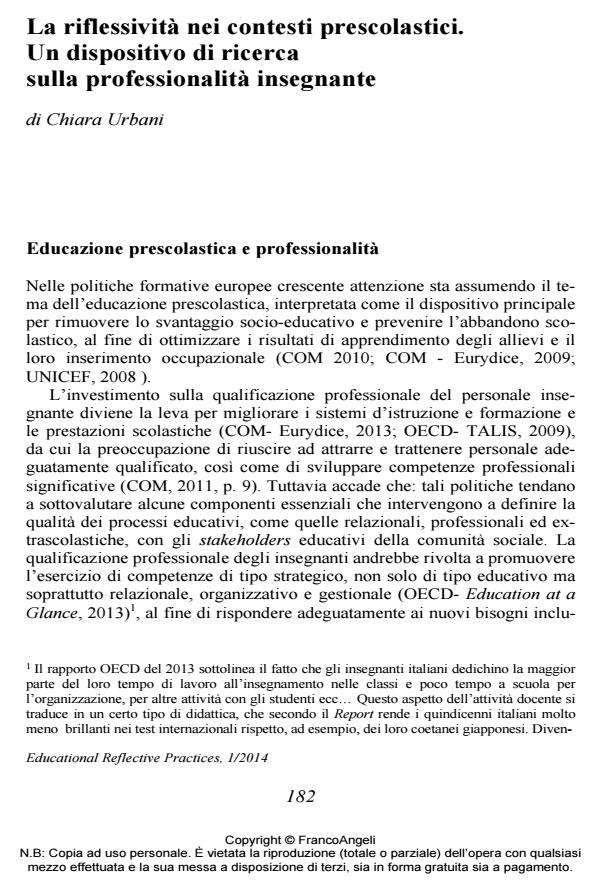La riflessività nei contesti prescolastici. Un dispositivo di ricerca sulla professionalità insegnante
Journal title EDUCATIONAL REFLECTIVE PRACTICES
Author/s Chiara Urbani
Publishing Year 2015 Issue 2014/1 Language Italian
Pages 14 P. 182-195 File size 145 KB
DOI 10.3280/ERP2014-001011
DOI is like a bar code for intellectual property: to have more infomation
click here
Below, you can see the article first page
If you want to buy this article in PDF format, you can do it, following the instructions to buy download credits

FrancoAngeli is member of Publishers International Linking Association, Inc (PILA), a not-for-profit association which run the CrossRef service enabling links to and from online scholarly content.
The pre-primary contexts are attracting more and more interest in relation to the qualification of educational systems, requiring an investment on the professional teachers’ qualifications. May a model centred on professional skills answer inclusive needs arising from enlarged contexts? The proposal to qualify the reflexivity device as a capability function on professional teachers’ agency allows you to bring educational and enlarged opportunities into significance and personal value, defining new inclusive paths for professional training.
- Alkire, S. (2005). Subjective quantitative studies of human agency. Social Indicators Research, 74, pp. 217–260
- Alsop, R., Bertelsen, M.F., & Holland, J., (2006). Empowerment in Practice. From Analysis to Implementation. Washington, DC: The International Bank for Reconstruction and Development/ THE WORLD BANK.
- Caudle, L., & Moran, M.J. (2012). Changes in Understandings of ThreeTeachers' Beliefs and Practice Across Time: Moving From Teacher Preparation to In-Service Teaching. Journal of Early Childhood Teacher Education, 33(1), pp. 38-53.
- COMMISSIONE EUROPEA (2010). Comunicazione della Commissione Europa 2020, Una strategia per una crescita intelligente, sostenibile e inclusiva, COM (2010a) 2020 definitivo, Bruxelles, 03.03.2010.
- COMMISSIONE EUROPEA/ EACEA/ Eurydice (2013). Cifre chiave sugli insegnanti e i capi di istituto in Europa. Edizione 2013. Rapporto Eurydice. Lussemburgo: Ufficio delle pubblicazioni dell’Unione europea COMMISSIONE EUROPEA (2009). Rapporto Eurydice, Educazione e cura della prima infanzia in Europa: ridurre le disuguaglianze sociali e culturali, Bruxelles: Agenzia esecutiva per l’istruzione, gli audiovisivi e la cultura.
- COMUNICAZIONE DELLA COMMISSIONE (2011). Educazione e cura della prima infanzia: consentire a tutti i bambini di affacciarsi al mondo di domani nelle condizioni migliori. Bruxelles, 17.2.2011, COM(2011) 66 definitivo.
- Costa, M., (2011). Criticità e opportunità di sviluppo professionale del docente nei primi anni di carriera in Italia. Formazione & Insegnamento, IX (3), pp. 42-58.
- Habermas, J. (1981; 1986). Teoria dell’agire comunicativo. Bologna: Il Mulino.
- Margiotta, U. (2010). Abilitare la professione docente. Lecce: Pensa MultiMedia.
- Mezirow, J. (2003). Apprendimento e trasformazione. Il significato dell’esperienza e il valore della riflessione nell’apprendimento degli adulti. Milano: Cortina.
- Mortari, L. (a cura di) (2010). Dire la pratica. La cultura del fare scuola. Milano: Bruno Mondadori.
- Nussbaum, M. (2012; 2011). Creare capacità. Liberarsi dalla dittatura del Pil. Bologna: Il Mulino.
- OECD (2013). Education at a Glance 2013: OECD Indicators. OECD Publishing.
- OECD-TALIS (2009). Creating Effective Teaching and Learning Environments: First Results from TALIS. Paris: OECD Publishing.
- Schön, D. (1993). Il professionista riflessivo. Per una nuova epistemologia della pratica professionale. Bari: Dedalo.
- Sen, A. (2000). Lo sviluppo è libertà. Perché non c’è crescita senza democrazia. Milano: Mondadori.
- Simoncini, K.M., Lasen, M., & Rocco, S. (2014). Professional Dialogue, Reflective Practice and Teacher Research: Engaging Early Childhood Pre-Service
- Teachers in Collegial Dialogue about Curriculum Innovation. Australian Journal of Teacher Education, 39(1), pp. 26-44.
- Symeou, L., Roussounidou, E., & Michaelides, M., (2012). “I Feel Much More Confident Now to Talk With Parents”: An Evaluation of In-Service Training on Teacher–Parent Communication. School Community Journal, 22 (1), pp. 65-88.
- Striano, M. (2001). La razionalità riflessiva dell’agire educativo. Napoli: Liguori.
- Tessaro, F. (2012). Lo sviluppo della competenza. Indicatori e processi per un modello di valutazione. Formazione & Insegnamento, X (1), pp. 105-119.
- UNICEF Report Card n. 8, (2008). Come cambia la cura dell’infanzia. Un quadro comparativo dei servizi educativi e della cura per la prima infanzia nei paesi economicamente avanzati. Firenze: Centro di Ricerca Innocenti.
- Urban, M., Vandenbroeck, M., Peeters, J., Lazzari, A., Van Laere, K. (2011). CoRe Competence requirements in Early Childhood Education and Care. Report for European Commission, DG Education and Culture.
- Vonta, T. (2004). Teacher Evaluation Using ISSA Standards: A Tool for Professional Development and Quality Improvement. Educating Children for Democracy, 7 (summer/fall), pp. 21-25.
- Wenger, E. (1999). Communities of Practice: Learning, Meaning, and Identity. Cambridge: Cambridge University Press
Chiara Urbani, La riflessività nei contesti prescolastici. Un dispositivo di ricerca sulla professionalità insegnante in "EDUCATIONAL REFLECTIVE PRACTICES" 1/2014, pp 182-195, DOI: 10.3280/ERP2014-001011